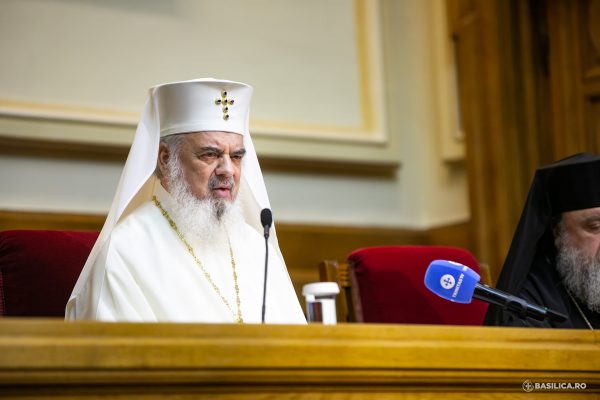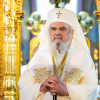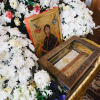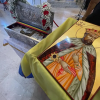Opening the works of the Spring Pastoral-Missionary Conference of the clergy of the Archdiocese of Bucharest on Monday, His Beatitude Patriarch Daniel stressed that prayer is an act of communion: “A Christian’s prayer, even offered in solitude, in one’s home or cell, is not a solitary prayer, but a solidary prayer, in communion with the whole Church in prayer and enlightened by the grace of our Lord Jesus Christ.”
“As members of the Mystical Body of Christ, believers are united by grace to one another, the suffering of one being borne by the whole ecclesial community, according to the apostolic exhortation,” the Patriarch of Romania said June 6.
“In this regard, Professor Rev. Dumitru Staniloae says that prayer can also be considered as people’s means of transcending from a life enclosed in selfishness and the world to a life of communication in God, as His kingdom,” His Beatitude explained.
2022 – Solemn Year of prayer in the Church’s life and the Christian’s life
The Holy Synod of the Romanian Orthodox Church proclaimed 2022 as a Solemn Year of Prayer in the Church’s and the Christian’s life and a Commemorative Year of the Hesychast Saints Symeon the New Theologian, Gregory Palamas and Paisius (Velichkovsky) of Neamț.
The knowledge of God as the primary condition for gaining the Kingdom of God – “Now this is eternal life: that they know you, the only true God, and Jesus Christ, whom you have sent.” (John 17: 3) – is closely related to prayer, because only through assiduous prayer can man attain to the knowledge of God by grace and union with Him.
Being created in the image of God (Genesis 1:27), man can be perfected only through close communion with God.
And Christ the Lord, true God and true man, is mystically present in the hearts of those who are in the communion of love with Him, according to His promise: “For where two or three gather in my name, there am I with them” (Matthew 18:20).
A Christian’s prayer, even when offered in solitude, in one’s house or cell, is not a solitary prayer but a solidary prayer, in communion with the whole Church in a state of prayer and enlightened by the grace of our Lord Jesus Christ, the love of God the Father and the fellowship of the Holy Spirit (2 Corinthians 13:13).
As members of the Mystical Body of Christ, believers are united by grace to one another, the suffering of one being borne by the whole ecclesial community, according to the apostolic exhortation: “Carry each other’s burdens, and in this way, you will fulfil the law of Christ.” (Galatians 6: 2), but also according to the spiritual counsel: “Pray for one another” (James 5:16).
In this regard, Professor Rev. Dumitru Stăniloae says that prayer “can also be considered as people’s means of transcending from a life enclosed in selfishness and the world to a life of communication in God, as His kingdom. Prayers indicate such a transcendence, or an exit of the self-confined man, to the Triune God, or of love, even when praying for the goods necessary for earthly life, as conditions of preparation for the kingdom of God.” (Spirituality and Communion in the Orthodox Liturgy)
Fervent and persistent prayer is a testimony to the fact that the Holy Spirit is active in man, supporting and strengthening him in the good work for salvation, as the Holy Apostle Paul teaches us, saying: “the Spirit helps us in our weakness. We do not know what we ought to pray for, but the Spirit himself intercedes for us through wordless groans.” (Romans 8:26).
Thus, through prayer, man unites with God, becoming a partaker of divine love. God, by His grace, enlightens the human soul who prays so that prayer becomes man’s co-operation with God, as St. Gregory Palamas affirms.
Without prayer, there is no Church and no Christian life because only Christ, by the grace of the Holy Spirit, gives saintly life to the members of the Church and helps them to remain in communion with Christ: “Remain in me, as I also remain in you. No branch can bear fruit by itself; it must remain in the vine. Neither can you bear fruit unless you remain in me. I am the vine; you are the branches. If you remain in me and I in you, you will bear much fruit; apart from me, you can do nothing. If you do not remain in me, you are like a branch that is thrown away and withers; such branches are picked up, thrown into the fire and burned. If you remain in me and my words remain in you, ask whatever you wish, and it will be done for you” (John 15: 4-7).
When a Christian prays and strives to unite with Christ through prayer, repentance, and the Holy Eucharist, Christ cleanses the branch “so that it will be even more fruitful” (John 15: 2).
But when a man is not interested in his salvation and selfishly breaks away the communion with God and his fellow people, he is “like a branch that is thrown away and withers” (John 15: 6); that is, he loses his partaking of the communion of love and eternal life in the Kingdom of Heaven.
Prayer has been called by some Saints: “the breath of the soul,” “the thermometer of faith,” “the work of the mind,” “the light of the heart,” etc.
The Orthodox Christian is urged to pray as much as possible, that is, unceasingly (1 Thessalonians 5:17), because prayer brings much holy love into the heart, unites us with God, and helps us to see a brother in every man and a gift of God in every beauty of creation.
Prayer helps us face life’s hardships and foretaste in this world the strength and joy of the Resurrection and eternal life.
Nothing can replace prayer, and no activity is more precious than it because it gives us inspiration and strength for the beautiful word and good deed […].
Prayer is the victory over man’s alienation from God, himself and his fellow people; it is a source of joy and becomes the life of our lives.
The pages of the Holy Scriptures contain not only many exhortations to pray but also examples of people praying and prayers, beginning with the example of Enos, the son of Seth, of whom Scripture mentions that he was the first among men to call upon the name of the Lord God (Genesis 4:26) and to the urging of the angel in the last chapter of the Apocalypse of the Holy Apostle and Evangelist John: “Worship God!” (Revelation 22: 9).
Christ the Lord teaches His disciples the Lord’s Prayer or Our Father, urging His disciples to pray persistently and unceasingly (Luke 18: 1-8), while the Holy Apostle Paul urges believers to pray continually, saying, “Pray without ceasing!” (1 Thessalonians 5:17).
Thus, we see that the Holy Apostles and the Holy Fathers did not understand that prayer was only a formal external action. On the contrary, they considered that all Christians are called to turn their whole life into prayer, that is, a permanent state of the soul’s communion with God. Saint Basil the Great explains, in a homily, what this means:
“Prayer is a petition for good addressed by the pious to God. But we do not rigidly confine our petition to words. Nor yet do we imagine that God requires to be reminded by speech. He knows our needs even though we ask Him not. What do I say then? I say that we must not think to make our prayer complete by syllables. The strength of prayer lies rather in the purpose of our soul and in deeds of virtue, reaching every part and moment of our life. (…) Thus you will pray without ceasing; if you pray not only in words, but unite yourself to God through all the course of life, and so your life be made one ceaseless and uninterrupted prayer.” (Saint Basil the Great, Homily on Martyr Julitta).
In other words, a Christian’s mind and heart will be permanently directed towards God, towards Christ the Lord.
Saint Symeon the New Theologian, deepening his patristic theology before him, wrote: “So, too, someone who prays continuously (I Thess. 5:17) has in this act included everything and is no longer obliged to praise the Lord seven times a day (Ps. 119:164), or in the evening, in the morning, and at noonday (Ps. 55:17): he has already done all that we do by way of prayer and psalmody according to the regulations and at specific times and hours.” (The Theological and Practical Treatises)
In connection with the unceasing or monologic prayer, as it has been called before, St. Gregory Palamas says: “All who are called after Christ (all Christians), in whatever group they may be, must work prayer unceasingly, according to the apostolic exhortation “Pray without ceasing!” […]. Not only the monks outside the world, but also men, women, and infants, sages, and the uneducated, and all together should learn prayer in the same way, and to this end to put all their efforts.” (Philotheus Kokkinos, Encomium in honour of Saint Gregory Palamas, PG 151, 573 CD)
Also, Saint Paisius of Neamț urged all Christians to pray with this prayer, writing0 about its benefits: “The holy prayer of the mind, by the power of the teachings (writings) of the God-bearing Fathers, worked by the grace of God, cleanses man from all passions, urges him to the most diligent observance of God’s commandments, and guards him unscathed from all the arrows of enemies and deceptions.”
We bless the opening of the pastoral-missionary conference of the clergy of the Archdiocese of Bucharest. We pray to the All-Compassionate God, Who is glorified and worshipped in the Trinity, to pour out His rich gifts on all the ministers of the holy altars, to fulfil more and more the duty to pray for the salvation of the believers who have been entrusted to them and to teach them, with time and without time, the work of prayer by which the joy and peace offered by Christ the Lord to those who love God come into the human soul.
† DANIEL
Patriarch of the Romanian Orthodox Church

















